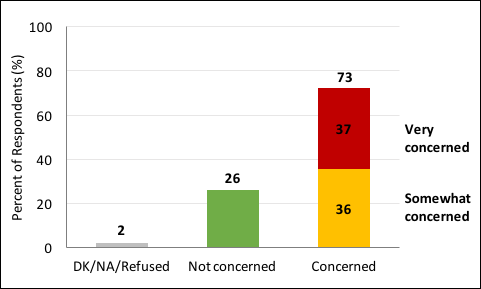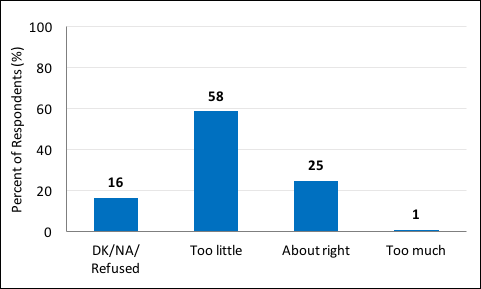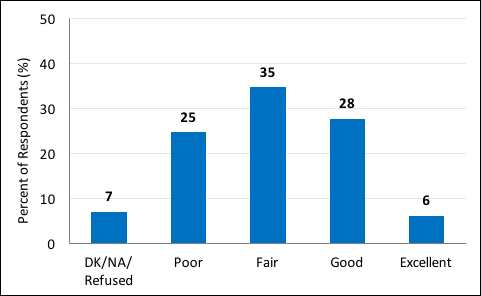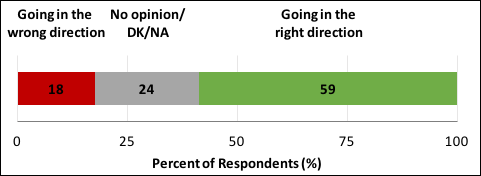Hurricane Irma greatly heightened concerns about the care of Florida’s senior population. But even before the storm, Floridians were worried that not enough is being done to care for and protect the state’s burgeoning senior population. (Florida has the nation’s highest proportion of residents 65 and older—20%.)
The 2017 USF-Nielsen Sunshine State Survey shows high levels of anxiety about elder issues: Nursing home costs? Too high. Protection against thieving caregivers? Too little. State provision of health care for seniors? Could be better. Option of physician-assisted ending of life? Moving in the right direction.
High Level of Concern About Nursing Home Care Costs
Nearly three-fourths of Floridians are concerned about nursing home care for themselves or a loved one. Worries are considerably higher among women than men: 44% of women are “very concerned” compared to 28% of men. Common explanations are longer life expectancies among women and a higher percentage of women caregivers—both at home and in assisted- living facilities and nursing homes.[1]
Age matters too. The greatest worries about nursing home costs are among Floridians 55-64 years old (46%). There are two reasons. First, this age group is more aware of the actual costs of nursing home care since many are already dealing with elder relatives in such facilities. Second, they are worried from a personal perspective. Many have not saved enough money for retirement and are quite aware that they are likely to live longer than today’s elderly and worried they won’t live better.
Availability of funds, namely annual household income, is another factor affecting attitudes toward nursing home care costs. Anxieties are highest (41%) among Floridians in the middle income bracket ($45,000-$74,999).[2]
The Orlando region has the highest proportion of “very concerned” residents (43%), driven in part by its larger share of non-college educated and lower income respondents, a large active retirement community stretching across three counties (The Villages), and a high growth retiree population in Flagler County.
Nearly three in four Floridians are concerned about the cost of nursing home care for themselves or a loved one
Question wording: “How concerned are you about the cost of nursing home care for a family member, a friend, or for yourself?”
 [Chart: USF]
[Chart: USF]
Note: Figures may not add to 100% due to rounding.
Source: Telephone survey of a random sample of 1,215 Floridians ages 18 and older conducted July 24-August 14, 2017. Margin of error ± 2.8%.
2017 USF-Nielsen Sunshine State Survey
Worry That Caregivers Steal Seniors’ Assets
The number of high profile cases involving a caregiver’s theft of the bank account or pension check of a helpless but trusting senior is on the rise. The worry about this atrocity is reflected in the high percent (58%) who criticize the State for doing “too little” to prevent it.
Most critical of the State’s efforts at tackling elder abuse by caregivers are racial/ethnic minorities (African Americans—72%; Hispanics—63%) and older Floridians: 65- to 79-year-olds (69%) and retirees (64%). Regionally, criticism is highest in the Miami/Fort Lauderdale and Palm Beach[3] regions, each with large, racially and economically diverse senior populations.
Most Floridians say that the State does too little to protect seniors’ assets from being stolen by caregivers
Question wording: “Is the State of Florida doing too much or too little to protect seniors’ assets from being stolen by caregivers, or is the State doing about right?”
 [Chart: USF]
[Chart: USF]
Source: Telephone survey of a random sample of 1,215 Floridians ages 18 and older conducted July 24-August 14, 2017. Margin of error ± 2.8%.
2017 USF-Nielsen Sunshine State Survey
State Needs to Do Better Job of Providing Health Care for Seniors
Just more than one-third (34%) of Floridians rate the State’s provision of health care for seniors as either “good” or “excellent.” The majority (60%) gives the State “fair” (35%) or “poor” (25%) marks.
Women are more likely than men to judge provision as “poor” (29% v. 20%). So, too, are 55- to 64-year-old Boomers (30%), the unemployed (30%), and low-income individuals (29%). The common thread here is concern about affordability—a worry that there is no strong safety net in place for them.
Regionally, the most critical ratings are from residents of the Naples region (38%)—an area with wide income disparity among its seniors.
Majority critical of State’s provision of health care for seniors
Question wording: “How good a job does the State do providing health care for seniors?”
 [Chart: USF]
[Chart: USF]
Note: Figures may not add to 100% due to rounding.
Source: Telephone survey of a random sample of 1,215 Floridians ages 18 and older conducted July 24-August 14, 2017. Margin of error ± 2.8%.
2017 USF-Nielsen Sunshine State Survey
Majority Favors Ending-of-Life Option
Florida law does not permit physician-assisted ending of life if requested by a terminally ill patient. A majority (59%) of those surveyed supports such an option, although nearly one-fourth (24%) has no opinion on whether passage of such a law would be a step in the right or wrong direction.
Support is highest among older Floridians 65-79 (65%), whites (64%), Hispanics (63%), and unemployed persons (62%). Support levels are lowest among African Americans (32%), many of whom relieve it is morally wrong based on their religion. Others are distrustful of the health-care system. Because they see it as racist, they are reticent to allow physicians to end their own or a loved one’s life. [4] African Americans are also the least likely to express an opinion on the issue (50%).
Regionally, residents of the Orlando region (68%) express the strongest support for the option. The greatest opposition is from North Florida—home to the state’s highest share of religious conservatives and a younger population overall.
Majority says allowing a physician to help a terminally ill patient end life if requested is moving in the right direction
Question wording: “There are lots of issues facing Florida today. If the State of Florida were to, and if terminally ill patients ask for it, allow doctors to help them end their life, would you say that is going in the right direction or the wrong direction, or do you have no opinion about it?”
 [Chart: USF]
[Chart: USF]
Note: Figures may not add to 100% due to rounding.
Source: Telephone survey of a random sample of 1,215 Floridians ages 18 and older conducted July 24-August 14, 2017. Margin of error ± 2.8%.
2017 USF-Nielsen Sunshine State Survey
Why Important? Florida 65+ Population Projected to Grow; Plan Now!
The 2017 USF-Nielsen Sunshine State Survey on critical aging issues offers individuals, decision makers, health care providers, and advocates a glimpse of how Floridians feel about this growing segment of the state’s population and how to care for them. Projections are that by 2040, Florida will have 6.7 million people 65 and older.[5] The last U.S. Census (2010) put the figure at 3.3 million. The jump from 17% in 2010 to 26% in 2040 makes elder-protective decisions urgent.
[1] Family Caregiving Alliance, "Women and Caregiving: Facts and Figures,” accessed September 21, 2017.
[2] A Business Insider analysis of Florida data reported the lower bounds of the middle class as $30,691 and the upper bound as $92,072 based on $46,036 as the state’s median household income. See Libby Kane and Andy Kiersz, “How Much You Have to Earn to Be Considered Middle Class in Every US State,” Business Insider, April 2, 2015.
[3] There may be a greater awareness of this issue in Palm Beach County. It has strict guidelines in place for caregivers. See Wayne Washington, “Palm Beach County requires license, fingerprinting for home caregivers,” Palm Beach Post, October 20m 2015, accessed September 21, 2017.
[4] Fenit Nirappil, “Right-to-die law faces skepticism in nation’s capital: ‘It’s really aimed at old black people’,“ The Washington Post, October 17, 2016, accessed September 21, 2017.
[5] Florida Demographic Estimating Conference, February 2017, and the University of Florida, Bureau of Economic and Business Research, Florida Population Studies, Bulletin 178, June 2017.
Interested parties may view results for all questions and detailed analysis, including questions not analyzed here and significant factors for all related questions, on the survey website, here.
The USF-Nielsen Sunshine State Survey is a collaborative learning opportunity between the USF College of Arts and Sciences and The Nielsen Company, LLC., which allows USF students to gain valuable experience before graduation. Each of the students below made significant contributions to this year’s survey. Valuable input into the survey question content and structure came from all students in the upper-level Media and Politics class (Spring 2017).












